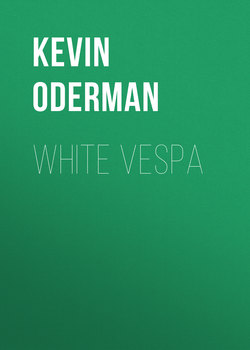Читать книгу White Vespa - Kevin Oderman - Страница 17
На сайте Литреса книга снята с продажи.
ОглавлениеNine
15 June
When he finished in the dark room Myles wanted out; it was close in there and the day had started to heat up. Standing by the refrigerator he filled a saucer with green olives as big as apricots, cut four slices of the black bread he’d bought that morning in Yialós, cut a half-inch thick slice off a block of hard white cheese, and arranged the lot on a sea-blue platter. He felt good. He liked what had turned up in the developing pan. With a paring knife he sliced up two thin-skinned tomatoes and set them on the platter next to the cheese. He pulled the cork out of a good bottle of Kourtáke retsina, poured a coffee cup full, put the cup on the platter, looked at it, and approved.
Sitting in the deep olive shade, he started on lunch. He was satisfied. One of the shots he’d taken of the beetle was good beyond all expectation. The sun poured in low and bright, and the gold back of the beetle shone white, like a new-risen moon. It cast a shadow almost to the edge of the frame. The grains of sand in the sun shone like Blake’s grain of sand, those in shadow looked dusky, ominous. He ate an olive, a chunk of cheese, a little bread. He tasted the retsina.
Then he heard his name called and there was Jim, looking hot in khakis and a Madras shirt and walking toward him.
“See you found the place.”
“Not a problem. And some kinda place you got here!” Jim said, looking around. He declined lunch but agreed to retsina. Myles brought out a second cup and the cold bottle, its deep yellow label covered in sweat.
“You left in a bit of a hurry the other night,” Jim said, as he tasted the wine.
“Yeah, that’s so. Have an olive. The salt improves the wine.”
“Don’t you want to know what happened?” Jim asked.
“I saw enough of what happened. Hurt girl.”
“Well, I stuck around. That Paul!”
“Yeah, what a guy.”
“I asked him what the girl was so pissed about,” Jim said.
“Yeah?” Myles said, not encouraging.
“Not very interested in this story, are you?”
“What do you expect? I’m a photographer! Story, that’s for film, maybe, or a novel. Boy meets girl. Girl has a bad time. Even as a story, it’s kind of an old one.”
Jim looked owlishly over the top of his sunglasses.
“But it’s not such an old story, at least not how Paul tells it.”
“Paul. I’m beginning not to like him.”
“Still, you’ve got to admit he’s charming,” Jim said.
“And handsome, way too handsome.”
“But a little old for that girl?” Jim asked.
“No kidding?”
“Well, Paul says he met her a couple of days ago, and they hit it off. Went on a picnic, swimming. They arranged to meet again that night. Paul was wearing just shorts and a T-shirt, no pockets. He’d stuck a condom in his waistband. Hopeful, I guess. But the edge of the thing scratched at him, so he slipped it into the back pocket of her jeans as they walked along the waterfront and then on out of town. Forgot about it. Later, they went to his place, where he was, as he said, supplied. Paul thinks her mother must have found it cleaning out pockets for the hotel laundry. Simple forgetfulness, that’s Paul’s story. Not like he forced himself on her.”
“What’s her name?” Myles asked.
“I don’t know. Paul didn’t say.”
“Why again did you want to tell me this story?”
They went inside, looked at photographs. Jim lingered in front of the man on the white Vespa but made no comment. He looked at the newly developed work and shook his head.
“Too good, Myles.” He was especially taken with the beetle, the great ovoid shadow drawn out of the beetle’s unexpected bulk. “What do you mean calling yourself an amateur?”
“Why not? What’s the advantage of being a professional? Lot of expectations I don’t need . . . I like the images, to make images. And Jim, no story, no one’s going to ask what that beetle did next.” Myles paused. “Paul wasn’t altogether wrong, what he said about the beetle becoming a scarab in my photograph. I want it to. And the very first thing I do to make that happen is kill the story.”
“Wait, wait,” Jim objected, “let’s not forget my profession. Stories are my life, you know, how I make a living!”
“There you have it. You are a professional,” Myles teased, having lost some of his intense seriousness.
“But most people need a story to make meaning, to find meaning,” Jim said. “They do just the opposite of what you do; they make stories out of the fragments of their lives.”
“Yeah, they do, and the meaning they make is story-meaning.”
“What?” For the first time Jim sounded a little puzzled.
“And stories are always sad,” Myles whispered.
“Surely not always?”
“You can only keep a story from getting sad by cutting it off before the end.”
